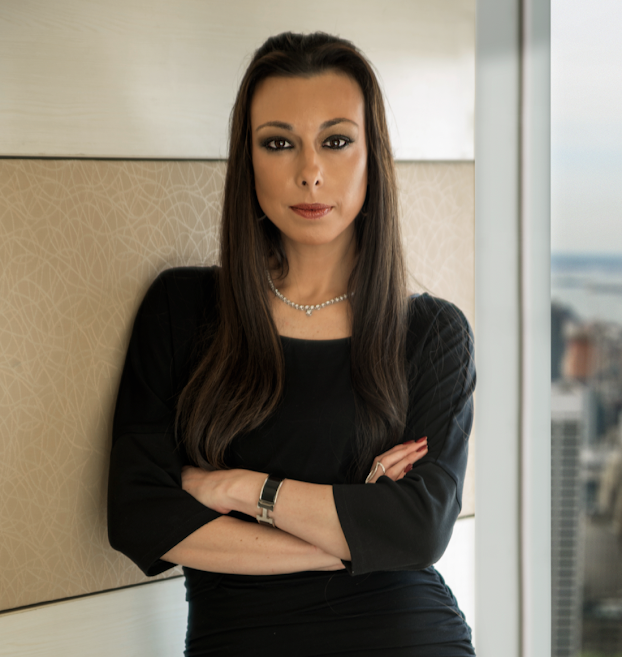
Power Women: Debbie Azar of Gemological Science International On How To Successfully Navigate Work, Love and Life As A Powerful Woman
An Interview With Ming Zhao (originally published on Medium)
Communication. Business is built on relationships, and your ability to be a clear communicator who is friendly and approachable goes a long way in adding value to your work, your company, and your customers.
How does a successful, strong, and powerful woman navigate work, employee relationships, love, and life in a world that still feels uncomfortable with strong women? In this interview series, called “Power Women” we are talking to accomplished women leaders who share their stories and experiences navigating work, love, and life as a powerful woman.
As a part of this series, I had the distinct pleasure of interviewing Debbie Azar.
Debbie Azar is the Co-Founder and President of Gemological Science International (GSI), one of the largest gemological organizations in the world, and a distinguished leader in the global diamond and jewelry industry. As an executive with extensive knowledge of the diamond and jewelry industry, her entrepreneurial skills and vision have helped GSI achieve rapid and continuous growth worldwide, establishing 13 leading-edge gemological laboratories on four continents. She has been featured as an industry expert in many leading media broadcasts and publications including Forbes, Good Morning America, Bloomberg Businessweek, Fox Business, CBS, Varney & Co, The Street, and NASDAQ.
Thank you so much for doing this with us! Before we dig in, our readers would like to get to know you a bit more. Can you tell us a bit about your childhood “backstory”?
My love for jewelry started when I was a child. I frequently traveled internationally with my family, and anywhere we went, I was allowed to choose a piece of jewelry as a souvenir. My favorites were pearl necklaces, little butterfly brooches, and gemstone rings in various colors. Every piece in my collection had a story with a memory behind it.
What continues to spark my interest in jewelry, now that I work in the industry, is everything that happens behind the scenes before a beautiful jewel ends up on display at a shop. Every time I look at a stunning diamond or gemstone, I can’t help but be mesmerized by how unique it is, the journey it took, and the lives and economies it’s touched and helped along the way. It’s remarkable.
Can you tell us the story about what led you to this particular career path?
My career began with the launch of a successful costume jewelry business. But I got my real start in the diamond industry somewhat unexpectedly while shopping near the famed “Diamond District” of New York City. I ran into a friend of mine on 5th Avenue and 47th Street. We started chatting, and she told me she was working for a “diamond dealer,” and mentioned that her boss was looking to hire additional staff. I thought, “Great, I can use a job until I figure out what I’m going to do with my life!” So, I interviewed and was hired on the spot. Eventually, I expanded my knowledge of the industry with sales, marketing, and business development roles in various companies.
In March of 2005, I joined forces with my Co-Founder, Mark Gershburg, to start Gemological Science International (GSI). We are the only major gemological organization established in the 21st century, and we have since grown to become one of the largest gemological entities in the world, with laboratory facilities spanning four continents.
Utilizing cutting-edge processes and proprietary technologies, along with a commitment to the highest ethical standards and practices, GSI provides manufacturers and retailers globally with a wide range of gemstone identification and grading services. We are very much committed to advancing gemological research and education.
In addition to my role in fulfilling both client and industry needs, I am honored to serve as a Board Member of Jewelers for Children (JFC), Diamonds Do Good, Jewelers Vigilance Committee (JVC), and the Responsible Jewellery Council, among others.
Can you share the most interesting story that happened to you since you began your career?
As a culturally diverse industry, along with our company reflecting that diversity with a global workforce, I have had some wonderful experiences and opportunities to learn and immerse myself in other cultures.
One of my most interesting experiences was my first time at an Indian wedding in Mumbai. I was used to North American weddings, which are usually a few hours long and are very understated. Traditional Indian weddings in India last a full week with 10,000 of your closest friends and family! When I arrived, I was amazed by all the beautiful Indian traditions. We got to wear traditional Indian saris and became a part of the real-life Bollywood experience. I loved every minute of the experience, and I look forward to sharing and learning more about the traditions of other cultures, which is a huge part of our industry.
You are a successful business leader. Which three character traits do you think were most instrumental to your success? Can you please share a story or example for each?
1. Confidence, which goes hand in hand with determination. If you are confident, you will be more action-oriented. Fear of failure and rejection are the greatest barriers to success. Opportunities exist all around you, every day, but if you are not alert and aware of these possibilities, or if you are too shy to talk to people, you can walk right past these opportunities. If you are insecure about making decisions, then you certainly won’t inspire others to put their trust in you. Risk-taking requires you to move out of your comfort zone with no guarantee of success. As an example, I took a huge risk by starting GSI with my partner, but with perseverance, dedication, and grit, the rewards have been well worth it. By taking a calculated risk, you will eventually overcome your fears of failure and replace them with the thrill of accomplishment. You’ll become more confident and competent as you move faster and faster towards your goals.
2. Strategic Thinking. Knowledge is a powerful tool and staying ahead of the curve is imperative. Sustained, concentrated, applied effort is the key to high performance and high productivity. Studying your industry and keeping up to date on innovations will help you become an “expert” in your field. The more you learn the skills required for business success, the more you will be able to recognize opportunities and possibilities as they are presented to you. This has proven true for me on a number of occasions.
3. Enthusiasm is important for a business leader because the excitement of seeing someone confidently take initiative is inspiring. If you are enthusiastic about a strategy or innovation you would like to propose to your colleagues, they will respond more positively to your ideas. Top performers in business define taking initiative as doing something well above and beyond the call of duty. It means taking risks, moving out of your comfort zone, and taking on tasks that prove your dedication. This sets a great example and helps motivate entire teams.
Ok, thank you for that. Let’s now jump to the primary focus of our interview. The premise of this series assumes that our society still feels uncomfortable with strong women. Why do you think this is so?
I was fortunate to grow up feeling empowered because I was a woman, not despite being a woman. Since I never felt “less than,” nothing held me back from pursuing my dreams.
When people are uncomfortable with strong women, it’s often a reflection of their issues and insecurities. You can’t let negative people erode your self-confidence. Focus on spending time with positive people who are worthy of your time and energy.
Without saying any names, can you share a story from your own experience that illustrates this idea?
Recently, I’ve noticed a lot of women (many of whom are just beginning their careers) talking about “Imposter Syndrome” which closely links to anxiety, fear, self-doubt, procrastination, negative self-talk, low self-esteem, tolerance for mediocrity, and roller-coaster performance. The feeling of not being deserving of an amazing career not only hurts the one who feels like an imposter, but it also hurts their colleagues and friends who care about them.
We are all responsible for doing the hard work that’s required to help us become the best possible versions of ourselves. That may mean going to therapy, confiding in supportive friends, reading books designed to teach coping techniques, hiring a personal trainer to improve our mind-body connection or a multitude of other things. When we feel balanced and emotionally healthy, then we project strength and confidence.
What should a powerful woman do in a context where she feels that people are uneasy around her?
It requires intuition and sensitivity to realize when people are intimidated by you. Being friendly and having something to talk about helps to break the ice, whether the topic is a new development in the industry you work in or current events in the news. If someone is still uneasy after you’ve tried to make them feel comfortable, that’s on them and isn’t a reflection on you.
You can’t undermine yourself and “dim your glow” just to please others.
What do we need to do as a society to change the unease around powerful women?
Stand in your power, with compassion and respect for others. Build others up instead of breaking them down. If everyone followed the “golden rule” of treating others how we would like to be treated, the world would be a better place.
When it comes to GSI, I make sure our team feels valued and rewarded. We have a “work hard, play hard” company culture, so we put effort into taking time to enjoy ourselves. We love to celebrate work anniversaries, and that means in-office celebrations with food, drinks, and a lot of laughter.
In my own experience, I have observed that often women have to endure ridiculous or uncomfortable situations to achieve the success that men don’t have to endure. Do you have a story like this from your own experience? Can you share it with us?
That hasn’t been my experience, fortunately.
Of course, a major challenge has been the pandemic, which has been a test for the world, countries, governments, and people. It tested us all, our strength and our resilience. We are all ready to move forward and put it behind us, but we will never forget what happened.
In your opinion, what are the biggest challenges faced by women leaders that aren’t typically faced by their male counterparts?
I think a lot of women have a tough time advocating for themselves, but that’s a skill that can be developed with practice.
Let’s now shift our discussion to a slightly different direction. This is a question that nearly everyone with a job has to contend with. Was it difficult to fit your personal and family life into your business and career? For the benefit of our readers, can you articulate precisely what the struggle was?
You cannot control all the intricate, infinite details of modern life. The way people react to you is often determined by your expectations and attitude towards yourself, and that includes setting boundaries when necessary. Anyone who knows me knows how intense I am, and that I relax best when I work. As far as balancing my career with being a wife and mother, I take it all in stride, one adventure at a time! Cultivating a sense of fun is important.
What was a tipping point that helped you achieve a greater balance or greater equilibrium between your work life and personal life? What did you do to reach this equilibrium?
Statistically, we make thousands of decisions every day, and many of these decisions inform our mental and emotional state. We can decide to take things in stride and remain calm, or we can let ourselves get overly stressed out over certain situations. Making time for self-care is important, as it replenishes our reservoir of energy for those times when we need to work long hours to push through deadlines or devote more time to family. Striving for balance is constant, and every day requires something different. That’s what makes life exciting!
I work in the beauty tech industry, so I am very interested to hear your philosophy or perspective about beauty. In your role as a powerful woman and leader, how much of an emphasis do you place on your appearance? Do you see beauty as something that is superficial, or is it something that has inherent value for a leader in a public context? Can you explain what you mean?
Women should embrace their beauty and adorn themselves however they wish. There is nothing superficial about feeling confident and taking pride in your appearance…plus, it’s a lot of fun!
I’ve always loved diamonds and jewelry, and I especially adore luxury fashion and accessorizing. My role as the President and Co-Founder of GSI requires a lot of on-camera interviews, so I’ve always been aware of how important it is to be stylish and well put together.
When Covid hit in 2020, we suddenly had to get used to working from home and attending Zoom meetings. More than ever, appearances began to dictate professionalism, translating into an “I care about you” motif, combined with a confident attitude.
I’ve always believed the best way to sparkle on video is to wear jewelry. Earrings, necklaces, and rings that flash whenever you move your hands add polish to your look.
How is this similar or different for men?
It’s the same for men. Think of how dashing the iconic movie character James Bond is, wearing a well-tailored suit with fine shoes and the perfect accessories.
Cufflinks, timepieces, and rings have always been the norm, but over the last decade, the need for men to further express their style and have some creative impact is more overtly evident.
The men’s jewelry market globally shows sustained growth, with much of it influenced by factors such as the internet, especially social media. The Instagram platform is rife with style strutters, with men taking selfies and making a huge fashion splash. This new era in men’s jewelry is being flaunted by the more mainstream male, as well as celebrities.
Ok super. Here is the main question of our interview. Based on your opinion and experience, what are the “Five Things You Need To Thrive and Succeed as a Powerful Woman?” (Please share a story or example for each.)
1. Vision. Create a clear vision for yourself, your family, your career, or your business, by imagining that you have no limitations whatsoever. Imagine that you could wave a magic wand and create a perfect future. What would that look like? What are the steps you need to take to get there? Vision is what helps you to take charge of shaping your destiny.
2. Perseverance. When you have a burning desire to achieve a goal of any kind, you will be driven towards it. Perseverance fuels ambition, and when people accomplish great things, it’s because they are passionate about what it is that they want.
3. Expect the Best. Your greatest obstacles are not external — they are internal and largely dependent upon your thinking. Many people think that they are not smart enough, creative enough, or talented enough to get what they want. The fact is that there are very few limitations on what you can accomplish if you believe you are worthy of achieving your goals and having a wonderful life.
4. Versatility. You must be willing to adapt and pivot as needed — especially when it comes to innovations and changes within your industry.
5. Communication. Business is built on relationships, and your ability to be a clear communicator who is friendly and approachable goes a long way in adding value to your work, your company, and your customers.
We are very blessed that some very prominent names in Business, VC funding, Sports, and Entertainment read this column. Is there a person in the world, or in the US with whom you would love to have a private breakfast or lunch with, and why? He or she might just see this if we tag them.
Do you have a time machine? Because I would absolutely love to have lunch with Coco Chanel. She was such an incredible innovator, liberating women from the “corseted silhouette” by popularizing the acceptance of more casual, chic fashions. She tore down the male-dominated ownership of “haute couture” fashion salons to open the first woman-owned fashion house in Paris.
Thank you for these fantastic insights. We greatly appreciate the time you spent on this.
Thank you for the interview!


